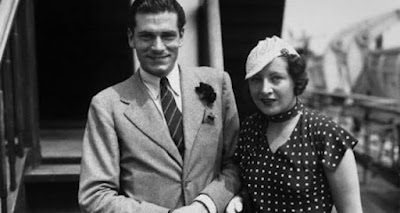I'm on the eternal hunt for the ideal Holmes and Watson pairing.
Oh, of course, many come close, like Jeremy Brett and David Burke in the celebrated BBC television series from the 1980s, or even Ian Richardson as Holmes, but alas, I can't recall his Watson, which is never a good sign.
 |
| Sir John Gielgud |
In a word, they're marvelous.
I mentioned Ian Richardson a moment ago, and I actually hold him up as the ideal Holmes. They only thing he didn't have was Holmes' height, but everything else was absolutely 100% spot on, from his mannerisms to his appearance.
John Gielgud is the same, only on the radio.
One doesn't need much imagination to conjure an image of Sherlock Holmes while listening to Gielgud's radio theater performance. He has just the right touch of arrogance and humility in his performance, the proper notes of conviviality paired with the behavior of a social recluse. That mixture is what makes Arthur Conan Doyle such a delight to read. It's not everyday that a lead character can be offensive and still likeable.
Gielgud plays Holmes with a genuine fondness for Watson, a nice change from some of the more unpleasant incarnations of the man, and he absolutely sells that the story is happening in real time, at this very moment. No small feat.
 |
| Sir Ralph Richardson |
I guess the real question is who do you see when you think of Dr. John Watson? I don't see an idle, fat man with absolutely no brains at all. I'll be forever troubled that Watson is often cast as such when there is no evidence at all in the canon that he was overweight and stupid. Opposite Holmes, almost anybody would seem stupid.
RR's Watson is delightfully amiable, awash with a warmth and enthusiasm for life that just makes the listener smile. He can and does keep up with Holmes on their ventures. His radio theater performance in The Dying Detective, the hurt and dismay he feels in thinking Holmes doesn't trust his expertise as a doctor, is perfection itself. Those authentic emotions are like nothing you have ever heard.
As if it were possible to improve on perfection, somehow this radio theater series managed it in the simple act of casting Orson Welles as Professor Moriarty in The Final Problem. Welles delivers an understated, calm performance as the devious Moriarty, a refreshing change to the Moriarty performances which hint at just a bit of crazy.
 |
| Sir John Gielgud, Sir Ralph Richardson, and Orson Welles |
Paired together, Sir John Gielgud and Sir Ralph Richardson elevate the Holmes canon with their performance.
They show how the stories can and should be performed. I would give almost anything for a new television rendering of the stories if I trusted the BBC to get it right. But I don't trust them to not stay true to Doyle's original stories, so there's no point in my even going on about it, alas.
On a complete side note, my one annoyance with the series is the narrator's continued ignorance. He insists on calling Watson, Dr. James Watson! I mean, really!?
The radio series has 16 episodes (how I wish it were longer!)
Dr Watson Meets Sherlock Holmes
A Scandal in Bohemia
The Red-Headed League
The Six Napoleons
The Blue Carbuncle (an absolute gem)
The Speckled Band (shivers galore)
The Disappearance of Silver Blaze
The Golden Pince-Nez
A Case of Identity
The Final Problem (an absolute must)
The Empty House (again, an absolute must)
The Second Stain
The Bruce-Partington Plans
The Dying Detective (my personal favorite)
The Norwood Builder
The Solitary Cyclist (another favorite)
You can find them all HERE for free streaming, which I think is a lovely service.
If you do get a chance to listen, what is your favorite of the stories? What do you think of the performances? And, most especially, which of the Holmes stories do you wish they had performed!











